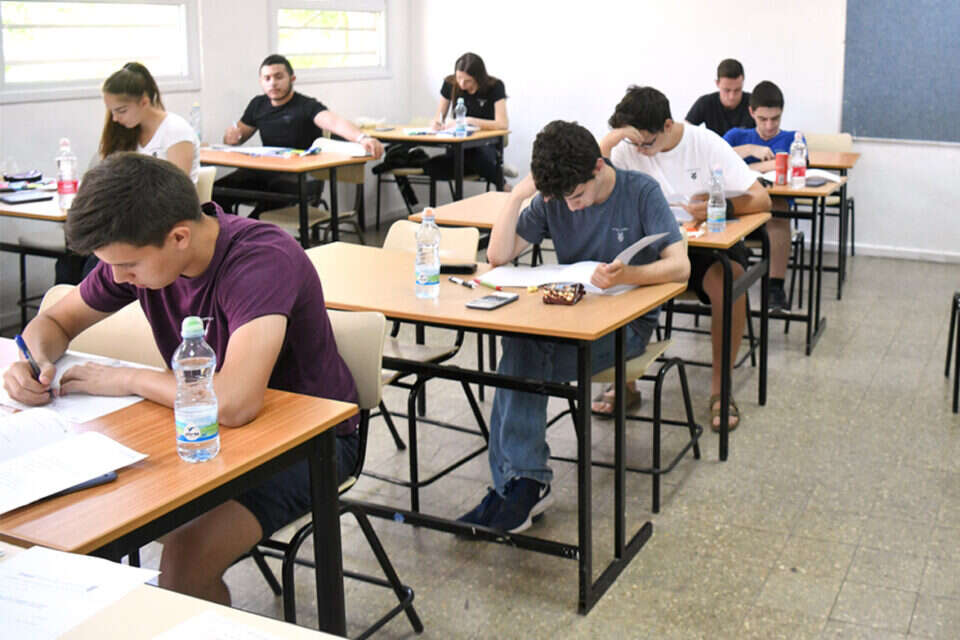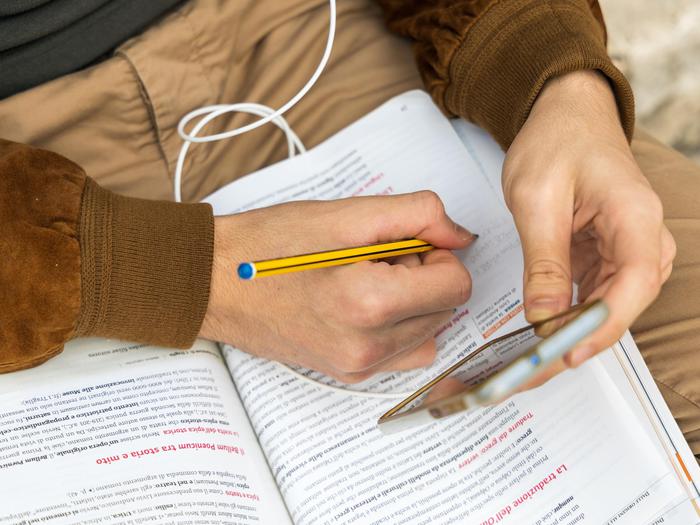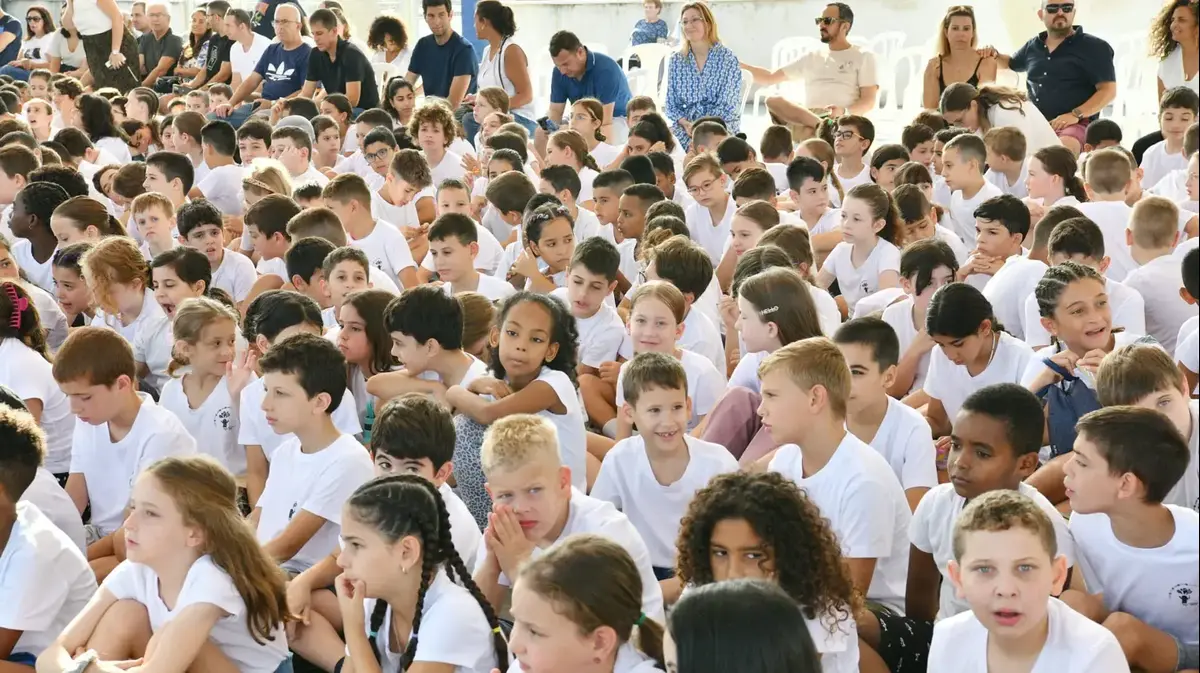Fewer tests, more freedom of action for administrators but without monitoring or cutting study hours:
this is what middle school studies will look like.
This year the Ministry of Education is launching a program that can change the face of learning in middle schools, which for years have been lagging behind.
It will include the possibility of combining subjects, but will not reduce the number of hours of study.
It presents innovative pedagogical ideas, but in practice school principals and teachers will not be obliged to implement them.
"Not to be afraid": about 20 thousand teachers at the huge demonstration at the Tel Aviv Museum // Archive photo: Noam (Dabol) Dvir
The new learning program in middle schools (grades 7-9) is being launched in the new school year (2017), after its implementation was delayed due to the corona epidemic. The move is supposed to change the way of studying for about 300 thousand students. The program is based on three significant moves: The subjects of study will come together in clusters and it will be possible to teach the subjects in the same cluster together. For example: the humanities subjects such as history, Jewish-Israeli culture, literature, the Bible, citizenship and geography will be concentrated under the "Heritage, Society and Spirit" cluster, and in classes it will be possible They will be taught together using the same texts. Additional clusters will be: mathematics, science and technology, languages, education and a healthy lifestyle, and a choice and enrichment cluster.
The second change concerns the organization of learning, a process that started already in the days of the Corona virus and means that a school principal will be able to divide the hours so that not all subjects are taught all the time.
For example: in the past they taught two hours of history per week in each of the years (7th-9th).
Now an administrator will be able to take the six hours of study in history and divide them, so that students will study three hours in the eighth grade and another three hours in the ninth grade, meaning that they will not study history in the seventh grade.
However, subjects such as language, English and mathematics will be required to study in each of the years for the whole week.
This is blessed because the number of subjects a student studies in one year will be reduced, and thus he will be able to concentrate and deepen in each subject.
At the same time, a teacher who has so far moved between a large number of classes, will now meet fewer students and thus be able to deepen the personal relationship.
Another significant change, the third in number, relates to the fact that the scope of the study material that has been studied traditionally will be reduced.
According to the new plan, 50% of the study material will be determined by the Ministry of Education, another 20% of the material will be chosen by the teacher and another 30% of the material will be based on other learning such as assignments, tasks and research work.
For example: the students will have to find information on the Internet and evaluate its quality, present it to the students in class, etc.
This is a process similar to that done in high schools, and the goal is for the students to arrive prepared for the new form of learning.
Cosmetic change
Despite the innovation of the program, it has quite a few problems.
The main one is that the principals of the middle schools are not obliged to act according to the plan and are not obliged to carry out the change.
In such cases, it is possible that for some managers only a cosmetic change will be made or not at all.
Bottom line, no one really knows what is going on in the schools, and the Ministry of Education does not monitor.
This means that there will be students who arrive less prepared for the new way of learning in high schools.
Also, the schools will not receive new resources, but will have to implement the plan from the existing budget, so that no more innovative classrooms and learning spaces, which are necessary for the benefit of such a plan, will be built.
Go into shock
The new program will neither reduce the number of subjects studied in middle schools nor the number of hours of study (but will only divide them differently).
These create an unreasonable burden on the Israeli students, who study a wide range of subjects, from literature and the Bible to mathematics and science and also Arabic - more than 14 subjects. Studies have shown that in Israel they focus on the quantity of study instead of its quality: the number of study hours in middle schools is high compared to the average in the countries OECD and stands at 28.2 hours per week, compared to 25 hours per week (year 2018). For example, in Finland they study only 21.5 hours per week and in Germany 24.4. All this when it is known that there is a negative relationship between the number of hours of study and student achievement.
"Many students go into shock when they reach middle school and begin to accumulate gaps. From the warmth of elementary school with the hugging teacher, they get lost in an endless train station, of a multitude of subjects loaded with material that only needs to be memorized," says Eli Horvitz, CEO of the Trump Foundation for Education. Precisely at the age when they are shaping their identity and need personal attention, they find themselves in crowded classes and in a race that they do not understand how it connects to their lives.
come out with more gaps
"In other countries, the middle school stage is given high priority. It is a stage where students build a solid knowledge base, develop skills and spend time thinking, understanding and solving problems in depth. The study content is connected to the reality of life, not just deriving functions and overlapping triangles, but doing it to understand how it works An autonomous vehicle and how an epidemic spreads. In Israel, we give priority mainly to the elementary school, where you learn the important basics, and to the high school, where you study for matriculation. Whereas the middle school, which was established to reduce gaps, is still burning behind without a clear goal, and the children leave it with bigger gaps than when they entered into her."
The Ministry of Education states that the new program should give priority to skills and in-depth learning.
They also point out that the program can reduce the number of tests - if administrators decide to teach certain subjects as one part.
Horowitz, photo: Yosef Edst
Were we wrong?
We will fix it!
If you found an error in the article, we would appreciate it if you shared it with us














